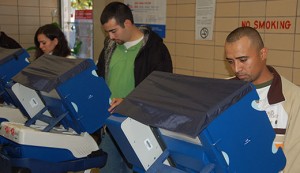A judge rejected an effort to bar the state from resuming a voter purge that is already on hold, issuing a ruling that could severely undermine the U.S. Department of Justice’s lawsuit against an initiative aimed at removing suspected non-citizens from the election rolls.
At the same time Wednesday, U.S. District Judge Robert Hinkle said his ruling was driven in part by assurances from the state that it would not forward any more names to county elections supervisors based on a list of potentially ineligible voters that even the state concedes is inaccurate. That list is drawn from driver’s license and voter-registration records.
“One message I did want to send along is, I’m still here,” Hinkle said.
But for the most part, the ruling served as a major victory for the state in the first significant ruling in the complicated legal battle over the effort to remove allegedly ineligible voters from the rolls. At least two other lawsuits have been filed against the state, which is in turn suing the U.S. Department of Homeland Security to gain access to a federal database that officials say would make future efforts more accurate.
One key element of the ruling — that the state could pursue the removal of non-citizens within 90 days of a federal election — seemed to pave the way for some version of the scrubbing to continue, especially if the state gains access to the federal Systematic Alien Verification for Entitlements database and can prove the effort isn’t discriminatory.
DOJ had argued that the federal National Voter Registration Act’s ban on removing formerly eligible voters from the rolls within 90 days of a federal election also barred the state’s current program.
“We are pleased with today’s decision because it is further confirmation that we are doing the right thing and following the law,” Secretary of State Ken Detzner said in a statement issued after the ruling. “The court agreed that identifying ineligible voters who have never had a right to vote will help prevent the votes of eligible citizens from being neutralized.”
Hinkle did suggest that he thought the state was too cavalier about the message that could be sent to newly naturalized citizens who might have done nothing wrong and gotten caught up in the purge.
“It’s not nothing and it’s not trivial,” he said. “But having an ineligible voter on the list is not a solution. … People need to know we are running an honest election.”
The ruling, which was only on a restraining order and does not end the case, seemed likely to intensify the battle over access to the SAVE database — especially with the state saying repeatedly that it was no longer using the state system to find questionable voters.
“We are not doing it today,” said Michael Carvin, who represented the state at Wednesday’s hearing. “We aren’t doing it based on the [state] data.”
In a statement responding to the ruling, Gov. Rick Scott continued turning up pressure on Homeland Security.
“Today’s ruling puts the burden on the federal government to provide Florida with access to the Department of Homeland Security’s citizenship database,” Scott said. “We know from just a small sample that an alarming number of non-citizens are on the voter rolls and many of them have illegally voted in past elections.”
But John “Bert” Russ, who argued the case for DOJ, said it wasn’t a sure thing that simply getting a better database would fix the problems with the purge.
“Errors will still creep in,” he said. “People will still get caught up in the process.”
The legal battle over the purge, as well as other fights over voter registration and elections laws, are taking place against the backdrop of a presidential election that could once again be decided by Florida’s 29 electoral votes. Hinkle acknowledged as much when Russ talked about the 90-day window ahead of the August primaries.
“Those people who are excited about this on both sides of this issue, they don’t care about the primary,” Hinkle said. ” … This is about the general.”
By Brandon Larrabee



